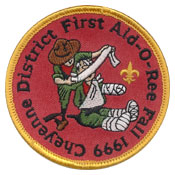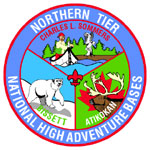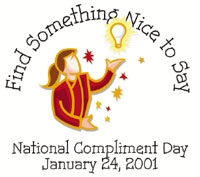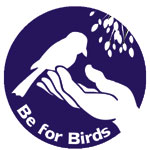![]() January-February 2001
January-February 2001

Edited by Scott Daniels

Beginning with a special 14-page section in its January issue, Boys' Life will be celebrating its 90th birthday throughout 2001. The kickoff issue, graced with a handsome cover painting by artist Joe Csatari, reprises nine decades of Boys' Life history and includes a separate section on community-service stories, as well as a look back at Scouting's four founders: Robert S. S. Baden-Powell, Ernest Thompson Seton, James E. West, and Daniel Beard.
Rounding out the section is a retrospective of Boys' Life covers and a reprint of "The King of Mazy May," a short story by Jack London which first ran in the magazine in March of 1911.
In its next 10 monthly issues, beginning in February 2001, Boys' Life will publish timelines that explore its past, one decade at a time. Then in December 2001, the focus shifts to the future and what tomorrow's readers can expect to see in the magazine.
Displays of BSA artwork by Norman Rockwell, Joseph Csatari, and the father-son team of Henry and John Hintermeister will be the featured attractions during the 15 stops scheduled for the 2001 Scouting Values Tour.
The tour is designed to honor local individuals for substantial contributions to their Scout council endowment fund and to serve as a catalyst for additional giving. At each location, the BSA will host a reception for donors and conduct an induction ceremony for new 1910 Society and Founders Circle members.
Locations and dates for the 2001 tour are Athens, Ga., Jan. 18; Monroe, La., Jan. 25; Columbia, S.C., Feb. 8; San Antonio, Tex., Feb. 15; Eugene, Ore., March 8; Reno, Nev., March 15; Ogden, Utah, March 29; Colorado Springs, Colo., April 19; Kansas City, Mo., April 26; Chicago, Ill., May 17; Des Moines, Iowa, May 24; Toledo, Ohio, Sept. 13; Rochester, N.Y., Sept. 27; Mechanicsburg, Pa., Oct. 18; Manchester, N.H., Oct. 23.
Since late 1999, local Scout councils have been hooked into an internal nationwide information system known as ScoutNET, the BSA's own "intranet." The system allows council, regional, and national staff to more effectively communicate, create and file reports, maintain records, and identify potential donors and new volunteers.
Local units that maintain records with computer software programs can also benefit from ScoutNET. By using specially approved unit management software, they can print the required documents for charter renewal and advancement information, and then create an electronic file on a diskette to return to the council with the completed paperwork and required fees. This reduces data entry time and potential errors, and provides the council with additional information, such as parents' names and employers. And units are assured that the council record for each Scout is an exact duplicate of the unit's record.
"The new software programs have many applications but all are designed to handle three vital unit management functions—creating electronic files for rechartering, advancement, and additional enrollment," says Jerry Hasting, who oversees the ScoutNet operation in the national office.
"Instead of waiting for the council to send out rechartering forms, then filling out the forms by hand and sending them back to the council office—where they have to be re-keyed and the risk of errors is high—units can use the software to create their own paperwork and an electronic file on a diskette," Hasting explains. "Mistakes, misinterpretations, and typos are virtually eliminated."
The software also simplifies tracking each Scout's progress in advancement. "With these new programs, one quick look tells you if you've got 10 Scouts who still need a particular merit badge," says Hasting.
The BSA worked with vendors of unit management software to develop new interfaces that provide easy access to ScoutNET and meet the specialized requirements of individual units. These include:
Some earlier versions of these programs no longer interface with ScoutNET, but upgrades are available for as little as $35 (for Windows version) and $45 (for MS-DOS version). The cost of new programs ranges from $50 to $70.
According to Al Westberg, director of the BSA's Council Services Division, more than 22,000 individual units nationwide had acquired the new software as of midyear 2000. This figure represents about 22 percent of all chartered Boy Scout and Cub Scout units.
"We look for major growth in the number of units using the program," Westberg said. "It can save the unit and the council a lot of time and money."
—Bill Sloan
During any or all of the four days from Feb. 16 to 19, individuals, families, classrooms, Scouts, and community groups all over North America will record the numbers and kinds of birds that visit feeders, parks, schoolyards, and other areas.
Information from the fourth annual Great Backyard Bird Count (GBBC) adds to a database that helps determine species in trouble. In 2001 in particular, GBBC focuses on the quail family, in which certain species—including northern bobwhite in the East and scaled quail in the Southwest—are experiencing severe population declines.
Participants enter observations at the BirdSource Web site, http://www.bird source.org, which also contains instructions for participation (which is free) and other information.
The GBBC is a project of the Cornell Lab of Ornithology and the National Audubon Society, with funding provided in part by Wild Birds Unlimited and Ford Motor Company. Groups interested in helping to promote the GBBC should contact the Cornell Lab of Ornithology, 159 Sapsucker Woods Rd., Ithaca, NY 14850, (800) 843-2473.
For more than 20 years, the Webelos-to-Scout transition in Pennsylvania's Columbia-Montour Council has received a major assist from the annual Cub Scout Skill Weekend, a spring event at which Boy Scouts pass along camping and outdoor skills to younger boys.
Last May, 46 Boy Scouts instructed 280 Cub Scouts and Webelos Scouts in areas ranging from Indian lore and local history to proper food storage and garbage disposal. They also hosted the Cub Scouts at a campfire with skits and Indian dancing. Participating packs competed to earn points for the orderliness of their campsites, neatness and cleanness of food preparation areas, and correct display of American and pack flags.
"The skill weekends have proved to be a very good program," said Dominic DeSpirito, district executive of the council's Iroquois District. "They build the younger kids' interest in camping and help get them excited about the transition to Boy Scouts. And we never seem to have a problem getting enough older boys to volunteer, which shows they enjoy the experience, too."
—Bill Sloan
Every November for the past quarter-century, some "terrible accidents" have taken place in Cheyenne, Wyo. But nobody gets hurt and scores of Cub Scouts, Webelos Scouts, Boy Scouts, and Venturers get vital hands-on training in first-aid procedures.

Since 1975, the annual First Aid-O-Ree held by the Longs Peak Council's Cheyenne District has enabled thousands of Scouts to learn lifesaving procedures in an exciting, educational, and highly competitive atmosphere.
"The event is divided into four divisions, with Scouts competing for first-, second-, and third-place trophies in each one, and it features the kind of simulated emergencies that kids often run into in everyday life," says district executive Joe Aschenbrenner.
Cub Scouts deal with minor injuries, like cuts and sprains, while Boy Scouts face more difficult problems, such as bike wrecks, mountain-climbing accidents, and potential drownings.
"One of our tougher situations this year involves an actual water rescue," says Aschenbrenner. "The 'victim' is a mannequin, but everything else is realistic."
Teams don't know what to expect until they encounter each accident. To add to the realism, live 'victims' are instructed to scream and struggle.
"Adults are allowed to watch, but they can't say a word," Aschenbrenner notes. "The event offers both practical first-aid training and personal growth. Scouts learn more than they could from any book."
The training has also helped to save lives, according to district commissioner Mark Palmer. "We've had several cases where Scouts with First Aid-O-Ree experience prevented severe blood loss after accidents by knowing the proper pressure points," he says. "And several heroism medals have been awarded because of things kids learned in these simulations."
The Scouts like the event because it builds their self-reliance and lets them show off first-aid skills, Palmer says. It also motivates them to work on developing those skills.
About 250 Scouts attended last year's First Aid-O-Ree in November. The event is open to Scouts throughout the council (which serves parts of Colorado, Wyoming, and Nebraska), but most teams come from the Cheyenne District.
"The competition is fierce, and because we've been doing this for so long, teams from other parts of our council may think Scouts from our district have a competitive edge," says Aschenbrenner. "They're probably right, too."
—B.S.
In going beyond the concept of special "Scout night" programs offered by many professional sports teams, the Pawtucket (Mass.) Red Sox minor-league baseball club takes an active role in helping three area BSA councils recruit new Cub Scouts.
This past summer, PawSox general manager Lou Schwechheimer offered the team's support for the annual Cub Scout rallies in the Moby Dick, Annawon, and Narragansett councils of Massachusetts and Rhode Island. In August, outfielder Jim Chamlee joined a group of Cub Scouts at the stadium to produce a series of public-service recruitment announcements for distribution to area radio and TV stations.
In addition, all new Cub Scouts, as well as those who recruit new members, will receive two complimentary tickets each to a PawSox game this spring. The ball club is setting aside 4,000 tickets in hopes that the councils can recruit more than 1,000 new Cub Scouts into the program.
Additional incentives, including a spring pregame picnic at the ballpark, are also being offered for packs that recruit the most new Cub Scouts and have the best percentage increase over last year.
—B.S.

Boy Scouts and Venturers who want to go to a BSA national high adventure base in 2002 must make reservations soon.
The Florida National High Adventure Sea Base will take reservations for the 2002 season on Feb. 5, 2001, from 10 a.m. to 2 p.m., Central Standard Time. Call (800) 637-4950.
Northern Tier National High Adventure Programs still have openings for 2001. Make reservations for 2002 starting on April 2, 2001, at 8 a.m. Central Standard Time. Call (218) 365-4811.

Philmont Scout Ranch treks are full for 2002, but spots for special summer and off-season programs are still available. Philmont will accept reservations for 2003 treks on Oct. 27, 2001, from 10 a.m. to 1 p.m., Central Daylight Time. Call (800) 962-4000.

Staff positions for 2001. This summer the BSA will hire about 950 people to work at Philmont Scout Ranch, 160 at the Florida Sea Base, and 120 at the Northern Tier bases. Jobs range from crew guide to mountain bike instructor to food server.
Applicants must be physically fit, age 18 (by June 1) or older, and available to work from May 30 to Aug. 21 (through Aug. 31 for the Florida Sea Base). Starting salary is based on experience and ranges from $718 to $1,000 per month. Room and three meals a day are included. Contact each base for an application and information:

Say something nice. Compliment at least five people on Jan. 24, National Compliment Day. Compliments are as much fun to give as to receive, and they forge bonds and dispel loneliness, as well," says Katherine Chamberlin, one of the event's founders. To receive ideas about activities geared to young people, e-mail Chamberlin at kathiecham@aol. com or write her at 724 Park Ave., Contoocook, NH 03229-3089.

Take a bird to lunch. February is designated as National Wild Bird Feeding Month because it is one of the harshest months for our fine-feathered friends. The National Bird-Feeding Society encourages people to give them a hand by providing food, water, and shelter. Tips on winter feeding and information on building nest boxes and birdfeeders are available on the society's Web site, http://www.birdfeeding.org. More information is available by contacting Sue Wells, the society's executive director, at (847) 272-0135.
Buckle up. Motor vehicle injury is a leading killer of children older than one year of age, either as an occupant of a motor vehicle, a pedestrian, or a bicyclist. To help children learn proper walking, biking, and riding techniques, celebrate National Child Passenger Safety Awareness Week, sponsored by the National Highway Traffic Safety Administration. For information, tips, children's activities, quizzes, and more, go to the NHTSA's Web site at http://www.nhtsa.dot.gov.
—Melanie Radzicki McManus
Copyright © 2001 by the Boy Scouts of America. All rights thereunder reserved; anything appearing in Scouting magazine or on its Web site may not be reprinted either wholly or in part without written permission. Because of freedom given authors, opinions may not reflect official concurrence.
| The Boy Scouts of America | http://www.scouting.org |